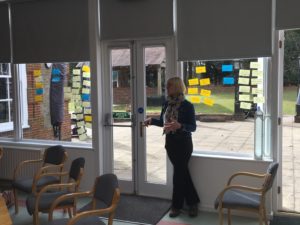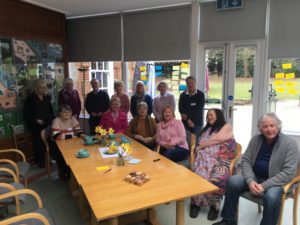Q&A with UKRI Healthy Ageing Catalyst Awards winner, Dr. Sarah Campbell
Zinc has partnered with UK Research and Innovation on the Healthy Ageing Catalyst Awards. Together, we aim to help researchers take an entrepreneurial approach to turn their insights into products and services with potential to reach a large scale. You can read more about the projects we are supporting at the Healthy Longevity Global Grand Challenge website.
Since September 2020, 33 researchers and projects have benefitted from the UKRI Healthy Ageing Catalyst Awards, receiving funding of up to £62,500 (fEC) from UKRI and a structured programme of support from Zinc.
One of the Awards winners for 2021 is Dr Sarah Campbell, a research fellow at the University of Surrey and CEO of serious games startup, Play Well for Life. She sat down with Tim Shakespeare, Research Acceleration Lead at Zinc, to talk about her experience and share her advice for researchers who want to tackle this kind of innovation work.
Read on to learn more about Sarah’s insights.
Tim: What are the skills that researchers have that make them well placed for this kind of innovation work?
Sarah: As researchers we’re well trained in how to create assumptions for research questions and how to test those, building up a good evidence base. I think that’s really perfect for this kind of project and this kind of work. It took me a while to mentally shift and recognise that the research skills I had were exactly the skills that were needed for market research, user research and testing assumptions. It would have been really helpful to have had that pointed out to me earlier!
One of the things I found challenging is understanding that the level of evidence we might look to build in academic research is too time intensive for this kind of project. It’s been interesting to work out how to take my skills and that rigour, and apply them in a much faster way, working out what standard of evidence is good enough. I found that talking to people in business has been really helpful to help me on that journey.

Dr Sarah Campbell – User Research
What new skills do you think researchers often need to develop when they take on a project like this?
The big one for me has been trying to get out of an academic style of writing and communication and into more of a marketing style of writing. I don’t have that skill yet! Someone said to me, don’t even try and develop it, just ask someone to help you with it. But I have got better at it. As an academic I was always trying to link to what the evidence was, making sure that things are properly referenced. But people don’t care about that in business. It needs to be sharp and snappy.
Some good advice I have had is to oversell the vision of where you want to get to, rather than overstating in formal language exactly what you produce in the project. It’s about thinking – if this is a 10 year project what would you be saying you’ve got to at the end of 10 years if everything went incredibly well.
Do the types of activities you do as part of the project differ with your Catalyst Awards, compared to other projects?
I would say user centered research and co-design is really important. I’m a user centered researcher, everything we do is co-designed, but the Catalyst Awards have allowed me to focus on that even more. I’ve got more value from talking to people in the focus groups I’ve run as part of my Catalyst project in an hour than I have from 4 months of reading the literature. It’s really exciting, and through these groups I’ve been hearing certain issues raised consistently, clear problems that need solving.
I think it’s important to understand what incredible value a group of older people have to bring from their life experience. That’s one of the exciting things about older adults in particular – they have such a wealth of life experience. One person said to me ‘they think we’re just old people and that none of us have done anything in our lives’ but actually they have an incredible amount to bring. And they know what their problems are.
This kind of approach is really important for understanding the problem but also for designing the right solution. I see a lot of cool tech-based ideas and designs that never get adopted and it’s because it’s not what people need, it’s not what people want. For example, people design great reminiscence products but consistently find that care homes don’t have the resource or time to embed them. But people continue to create more reminiscence products! The problem that we need to tackle is to create products and services that are feasible to embed in the system that exists.
The Catalyst project is exciting because it’s about looking at the real problem and designing for that, and working hard to avoid our tendency to just design the thing we want to design. It’s an opportunity to really make a difference for older people, their friends and family around them, as well as people who work with them.
What words of advice would you have to people thinking of applying for a Catalyst Award?
I came into the Catalyst Award with a really fixed idea of what I was going to design and deliver. Within the first 6 weeks it was very apparent that it was absolutely not what the older adults we were working with wanted, so we changed our approach based on what we heard. So I would say come with a vision and a passion and a problem. Don’t come with a solution. As academics we’re used to having a proposal, writing it, getting it funded, then going and doing it. I’d really encourage people to enter this process ready to adapt based on what you learn, and with a real willingness embrace the uncertainty that comes from this.
The other thing I’d say is that the support and engagement with Zinc is absolutely incredible. I’ve been on various programmes that are a bit like this and from my experience what Zinc offers is not available anywhere else. So see it as a real opportunity that can continue to benefit your ongoing work, and as a way to be part of a community and make new connections that you will be able to draw on indefinitely.

Whiteley Village Research Group
Thank you so much for sharing your experience and your advice with us Sarah!
You can read more about Dr Campbell’s venture, Play Well for Life, at her website. You can learn more about the Zinc team at our website.
Join the Zinc community
Stay up to date with all Zinc updates and future posts as part of our fast growing community.
Featured Resources
Impact Report 2023
We started Zinc with the hypothesis that missions are an effective way to attract highly ambitious, talented and experienced groups of innovators, who might not recognise themselves as “classic entrepreneurs” but are ready and able to start a new commercial and successful venture to tackle some of our most pressing societal issues.
The world has overcome the sorts of challenges we face today when it has adopted a mission-based approach to the biggest problems and brought together world-class talent to invent and innovate, e.g: NASA and landing a man on the moon, the LSE blueprinting the British welfare state, or the Gates Foundation aiming to eradicate diseases.
On this basis and assumption, we designed Zinc as a new mission-based Venture Builder — a place where global talent, ‘impact makers’, can join to experiment and develop new solutions to our most pressing societal issues.
To Eliminate Environmental Threats to Our Health
Environmental health threats pose a grave danger to human health and well-being, causing suffering to individuals and communities worldwide. These threats, which include chemical pollution, climate change, and biological hazards, cause acute and chronic diseases and exacerbate existing health conditions.
To protect those we care about, we must tackle the causes of environmental degradation, shield people from the consequences of environmental harm, and, where protection fails, we must mitigate the health impacts they suffer.
This demands action to improve all aspects of our environment: soil, food, air, water, and the built environment. It requires us to focus on every aspect of human health to reduce suffering.
Entrepreneurship and technology are powerful means to tackle these challenges. That’s why we are backing 70 founders to build innovative companies addressing this mission.


